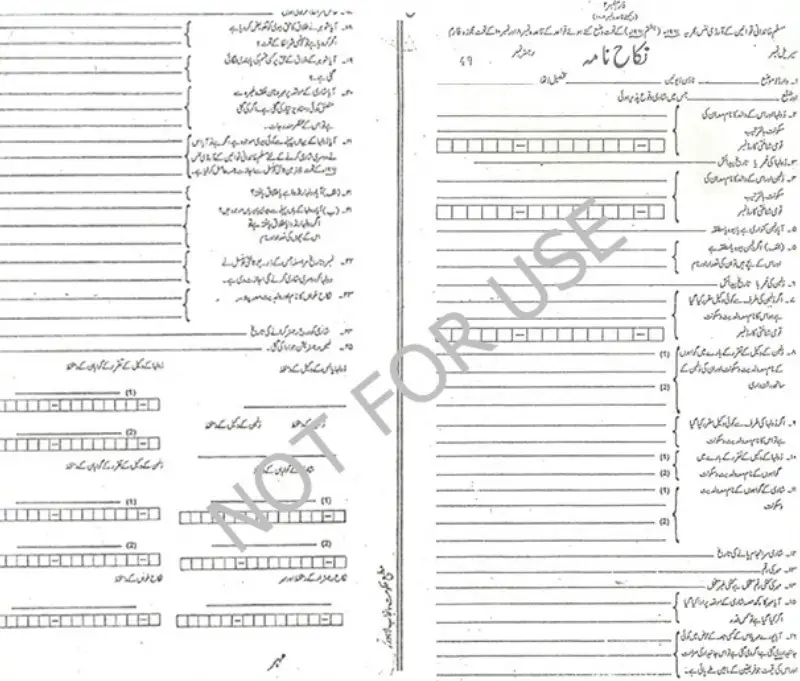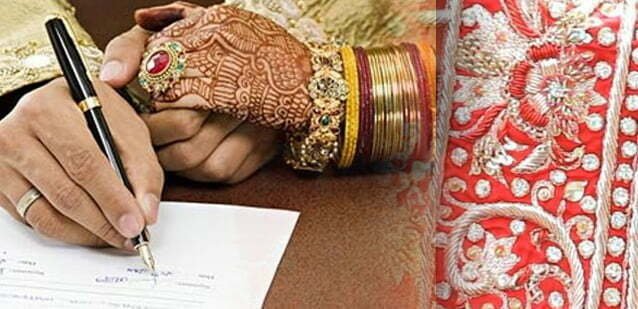- Karachi
- lahore
- islamabad
The Nikah Nama contains the details and terms and conditions of the Nikah (marriage) contract as well as a social contract. There is information about the parties to the marriage, the amount of dower, the conditions of the Nikah established between them, as well as the names and addresses of witnesses. Since marriage registration is a public document, it can be used as evidence in court in case of a divorce dispute.
A Nikah Nama clearly represents the facts and conditions agreed between the parties in its columns, which are differentiated by numbers.
It is important to complete the Nikah Nama in a timely manner and with the utmost care. Facts recorded in a dispute must be understood clearly and there must not be any ambiguities if they are recorded.

Columns in the Nikah Nama are provided for storing specific information along with settlements between the parties regarding dower, maintenance or dower documents, a delegation of talaq rights by the husband to his wife, or restrictions on talaq rights by the husband. An additional column can be used to record any special conditions agreed upon between the parties.
A marriage may not use all of the columns in the Nikah Nama
The Nikah Nama may not be able to incorporate all of the columns depending on the circumstances surrounding the marriage. It is obvious that there will be some columns to fill out in every marriage. Other than that, they are as follows:
In the case of the marriage in question, they should be filled out. Whenever any kind of information needs to be provided in relation to a specific column, fill in these columns with ‘if’ or ‘whether’.
In column seven, the bride is asked if she has appointed a representative (the word vakeel in Urdu means lawyer, but in this context, it is used to mean representative). The column should only be filled in if the bride has appointed one, and it is not mandatory for her to do so.
In order for the Nikah Nama to be recorded, there must be an agreement between the parties before or during the Nikah. Conditions can generally be revised with mutual consent between the parties, however, it is best to record them separately with the Registrar appointed under the Registration Act of 1908 in the form of acknowledgments or agreements, depending on the nature of the condition or settlement.
There are three types of Nikah Nama Columns
First Category of Columns
The first category of columns requires factual information about both parties. It is the responsibility of the Nikah Khwan/Registrar to ensure that the names and dates of birth of the interested parties are the same as those on their ID cards and/or B Forms. It is permissible to mention both the current and permanent addresses if they are different.
A marriage that is found to be an underage marriage without checking the documentation will result in liability for the parties.

The bride’s vakeel or representative is usually appointed based on her marital status, but she is not required to do so. If no representative has been appointed, it must be clearly stated that she has not appointed anyone. The next two columns should be filled in carefully with the names and relationships of the two witnesses to the appointment of the bride’s representative. These columns should clearly indicate that they do not apply. A relationship between the witnesses and the bride’s representative must be disclosed. It is not necessary for witnesses to be related to the bride, but they should state how they are related to the representative. Both cases cannot have the same witnesses.
The registrar must ensure that the witnesses appointed as vakeel and witnesses for the marriage are not the same.
Additionally, if the groom is a widower or divorcee, or if he has a child/children, their names and ages must also be included. A groom may contract another marriage after obtaining permission from the relevant authorities
The reference number and date of the letter need to be recorded if the groom has an earlier wife/wives and the certificate is issued by the Arbitration Council. The Nikah Registrar cannot be held responsible if he discovers later that the groom is contracting a second marriage without permission from the Arbitration Council.
A Nikah Nama provides columns for the husband’s status (widow or divorcee) and whether a child is present.
Before moving on to the actual columns and what the inquirers are asking, it ought to be noted that it is not permissible for the parties to decide on conditions contrary to the spirit of Nikah. Even if the parties agreed to such a condition, it could not be legally enforced.

Legal rights belonging to either party should not be affected by the marriage. Curtailment or conditions can be imposed on a right, but termination is not possible. You can find something like this in the Nikah Nama, which states that the wife cannot petition a Court for a Khula- even if it’s agreed upon. Even if this is the case, it’s illegal and cannot be enforced legally. If the contract between the two parties states the mother will not be responsible for her children’s maintenance because she is legally obligated to take care of them, then it would also be deemed invalid.
The conditions of Nikah Nama should be carefully drafted
To avoid terminating a lawful right, Nikah Nama’s conditions should be carefully drafted. In order to determine whether a lawful right is being surrendered, one must first determine whether the right is valid and, second, whether the subject is aware of its consequences.
A valid Nikah is one that is performed correctly. Nikah Namas containing void conditions are not invalid.